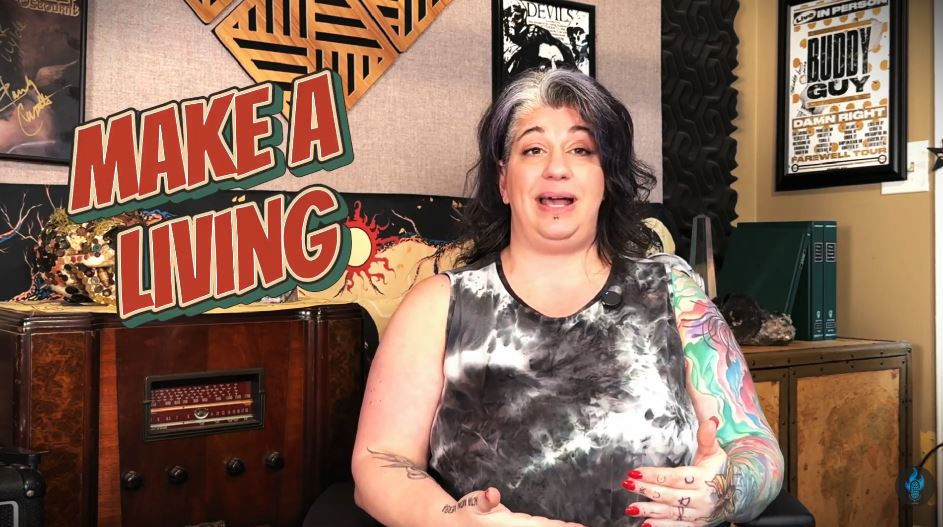Which Recording Software is Best for Voice Over?
- Gabrielle Nistico VOCoach

- Nov 16, 2021
- 3 min read
Remember to subscribe for more info from Voice Actor and Voice Over Coach Gabby Nistico.
Which Recording Software is Best for Voice Over? - 3:55
Recording software, D-A-Ws, DAWS, whatever you call them, doesn't matter. Today we're talking about recording technology. Hey guys welcome, to another edition of The Gift of Gab. Today we're talking about recording software.
I get asked all the time about what software to use, what software should I be using, what software is the best software... oh boy. All right. So first off, let's talk about some of the names the brands that you've probably heard repeatedly. The two that I think are the gold standard are Adobe Audition and Pro Tools. Those are the ones you hear about most often, but there are loads of products out there. There's Reaper, there's Garage Band, there's Audacity... some of these programs are free, some of them cost money, and that is literally just the beginning. There are dozens of audio recording softwares out there. Here's the big secret about them: they all do the same thing. Yeah, seriously, doesn't really matter which one you choose. They're all basically the same thing. What matters is: do you know how to use it and do you know how to use it to get the kind of results that you need in your audio?
That's it. Most clients, most producers, do not care what you are using to record yourself. What they do care about is that the equipment going into the software you're using is quality. They want to know you have a good microphone, they want to know you have a phenomenal interface, that's more important than exactly what type of software you're using. Now yeah, some of them come with plug-ins, some of them come with all kinds of bells and whistles and after effects and really cool things like Izotope. Izotope's an amazing tool if you know how to use it. If you don't... probably not worth messing with. What you're concerned about, if you're just starting out in this, is making sure you have something that you know how to record on, save files, do basic file editing and cleanup, convert those files to whatever format is being asked of you, mostly MP3 and WAV, and then making sure that you can, of course, archive them and play them back for your own purposes and to be able to keep track of your progress. Honestly the specifics, the minutia of what they do really is identical. They record, they splice, they edit, they allow you to do what's called a punch and roll, they allow for effects patches, they allow you to do single track mixes or multi-mixes, but none of that stuff really matters.
The average voice over recording is a super simple, super basic process. In fact, I've been saying this for the better part of the last 20 years, even those of us who use tools like Adobe Audition and Pro Tools which are, again, top of the line: we only use them to like less than 10% of their actual capability, because most of that technology was created for orchestral recording and big music compositions and things that we don't get anywhere near. So yeah, there you go. Hopefully this helped. If you have any questions you can always drop me a line or you can check out this video that has tips and tricks on the basics of editing for voiceover. Thanks guys!
704-674-8294 / GabrielleNistico.com / gabby@voiceovervixen.com
Gabrielle Nistico, Gabby Nistico, The Voiceover Vixen, The Business First VO Coach, #VoiceoverVixen #VoiceOnFire #BusinessFirstVOCoach Voiceover, Charlotte, North Carolina, Voiceover Demo, Voiceover Coaching Advice, What Not To Do, Working Actors, Los Angeles, New York,, How to Be a Better Voice Actor, voiceover coaching, YouTube Channel, Voice Acting Coach, student, learning, Adobe Audition, Izotope, ProTools, Audacity, DAW, audio recording, audio engineer, audio editing, software, recording tools, recording tricks and tips









代发外链 提权重点击找我;
google留痕 google留痕;
Fortune Tiger Fortune Tiger;
Fortune Tiger Fortune Tiger;
Fortune Tiger Slots Fortune…
站群/ 站群;
万事达U卡办理 万事达U卡办理;
VISA银联U卡办理 VISA银联U卡办理;
U卡办理 U卡办理;
万事达U卡办理 万事达U卡办理;
VISA银联U卡办理 VISA银联U卡办理;
U卡办理 U卡办理;
온라인 슬롯 온라인 슬롯;
온라인카지노 온라인카지노;
바카라사이트 바카라사이트;
EPS Machine EPS Machine;
EPS Machine EPS Machine;
EPS Machine EPS Machine;
무료카지노 무료카지노;
무료카지노 무료카지노;
google 优化 seo技术+jingcheng-seo.com+秒收录;
Fortune Tiger Fortune Tiger;
Fortune Tiger Fortune Tiger;
Fortune Tiger Slots Fortune…
站群/ 站群
gamesimes gamesimes;
03topgame 03topgame
EPS Machine EPS Cutting…
EPS Machine EPS and…
EPP Machine EPP Shape…
Fortune Tiger Fortune Tiger;
EPS Machine EPS and…
betwin betwin;
777 777;
slots slots;
Fortune Tiger Fortune Tiger;
google seo…
03topgame 03topgame
gamesimes gamesimes;
Fortune Tiger…
Fortune Tiger…
Fortune Tiger…
EPS машины…
Fortune Tiger…
EPS Machine…
EPS Machine…
EPP Machine…
EPS Machine…
EPTU Machine…
EPS Machine…
seo seo
Hi! You have a great video, it's a pity that you didn't show the programs that are best suited for this. I decided to find information about it on my own and read more articles on the Internet. I was surprised that there are quite a lot of voice screen recorders.